ImportError: cannot import name Mapping from 'collections'
Last updated: Apr 9, 2024
Reading time·14 min

# Table of Contents
- Cannot import name Mapping from 'collections'
- Cannot import name MutableMapping from 'collections'
- Cannot import name Sequence from 'collections'
- Cannot import name Iterable from 'collections'
- Cannot import name Callable from 'collections'
Make sure to click on the correct subheading depending on your error message.
# ImportError: cannot import name Mapping from 'collections'
The Python "ImportError: cannot import name Mapping from 'collections'" occurs for multiple reasons:
- Trying to import the
Mappingclass from thecollectionsmodule in Python versions 3.10+. - Installing a module that imports the
Mappingclass from thecollectionsmodule using Python versions 3.10+.

from collections import Mapping ImportError: cannot import name 'Mapping' from 'collections' (/usr/lib/python3.10/collections/__init__.py) [end of output]
There was a change in Python 3.10 and the Mapping class has been moved to the
collections.abc
module.
# Update your import statements
If you use Python version 3.10+, change your imports from the following.
# ⛔️ Old import for versions older than Python3.10 from collections import Mapping print(Mapping)
To import from the collections.abc module.
# ✅ New import for versions Python3.10+ from collections.abc import Mapping # 👇️ <class 'collections.abc.Mapping'> print(Mapping)
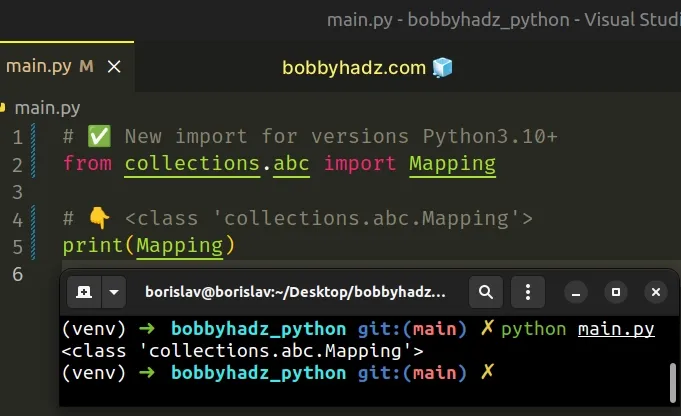
Your error message will contain the file and line where the error is raised.
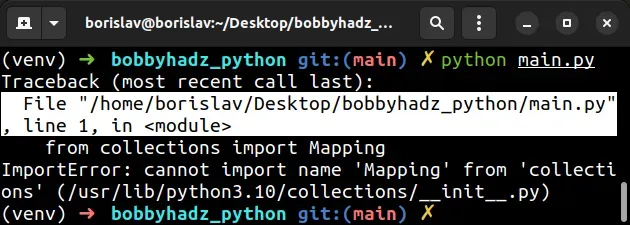
For example, the screenshot above shows that the error occurred in a main.py
file on line 1.
# Running your code in multiple Python versions
If your code needs to run in versions before and after Python 3.10, use a try/except statement.
try: # 👇️ Using python 3.10+ from collections.abc import Mapping except ImportError: # 👇️ Using python 3.10- from collections import Mapping # 👇️ <class 'collections.abc.Mapping'> print(Mapping)
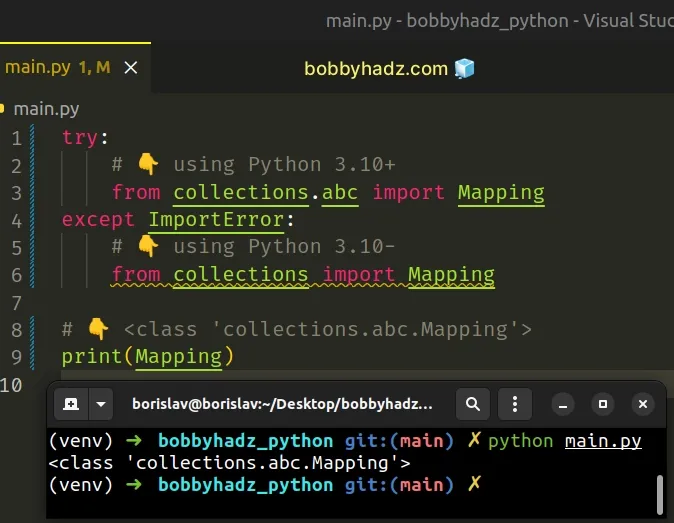
The try statement tries to import the Mapping class from the
collections.abc module and if an ImportError is raised, we know we are
running a version older than 3.10, so we import the class from the collections
module.
You can view all of the classes that are available in the collections.abc
module in
this section
of the docs.
# Upgrade packages that cause the error
If you got the error when pip installing a third-party module, try upgrading
the module's version.
pip install requests --upgrade pip3 install requests --upgrade python3 -m pip install requests --upgrade

requests with the name of the package you are trying to install.If that didn't help, try running the pip install command with the --pre
option.
The --pre option makes it so pip includes pre-release and development
versions of the package. By default pip only finds stable versions.
pip install requests --pre pip3 install requests --pre python -m pip install requests --pre python3 -m pip install requests --pre
Make sure to replace requests with the name of the actual package you are
trying to install.
--pre if you need to get access to a feature that is not yet available in the stable version.This helps sometimes because there might be a prerelease version where the
import statement has been updated to from collections.abc import Mapping which
is the correct import in Python 3.10+.
# Patch the error by adding attributes to the collections module
Alternatively, you can add attributes to
the collections module and point the attributes to the classes in
collections.abc.
import collections.abc # 👇️ Add attributes to `collections` module # Before you import the package that causes the issue collections.Mapping = collections.abc.Mapping collections.MutableMapping = collections.abc.MutableMapping collections.Iterable = collections.abc.Iterable collections.MutableSet = collections.abc.MutableSet collections.Callable = collections.abc.Callable # 👇️ import the problematic module below # import problematic_module
You only have to add the attributes for the classes the module imports.
Make sure to import the module that causes the issue after you have added the necessary attributes.
You can check your Python version with the python --version command.
python --version python3 --version

You can download a specific version (e.g. 3.9) from the official python.org website.
Different versions are available in the "Looking for a specific release" table.
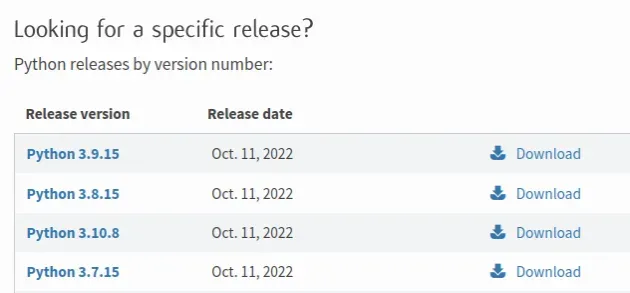
Make sure to tick the following options if you get prompted:
- Install launcher for all users (recommended)
- Add Python to PATH (this adds Python to your PATH environment variable)
To solve the Python "ImportError: cannot import name 'Mapping' from 'collections'" error:
- Import the
Mappingclass fromcollections.abc, as a change was made in Python 3.10. - Update the versions of any modules that have old import statements.
- Alternatively, revert to Python 3.9 if you are unable to make corrections.
# Cannot import name MutableMapping from 'collections' - Python
The Python "ImportError: cannot import name 'MutableMapping' from 'collections'" occurs for multiple reasons:
- Trying to import the
MutableMappingclass from thecollectionsmodule in Python versions 3.10+. - Installing a module that imports the
MutableMappingclass from thecollectionsmodule using Python versions 3.10+.
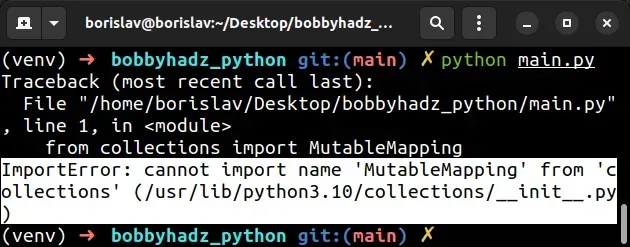
ImportError: cannot import name 'MutableMapping' from 'collections' (/usr/lib/python3.10/collections/__init__.py)
There was a change in Python 3.10 and the MutableMapping class has been moved
to the
collections.abc
module.
# Update your import statements
If you use Python version 3.10+, change your imports from the following.
# ⛔️ Old import for versions older than Python3.10 from collections import MutableMapping print(MutableMapping)
To import from the collections.abc module.
# ✅ New import for versions Python3.10+ from collections.abc import MutableMapping # 👇️ <class 'collections.abc.MutableMapping'> print(MutableMapping)
Your error message will contain the file and line where the error is raised.
# Running your code in multiple Python versions
try/except statement.try: # 👇️ Using python 3.10+ from collections.abc import MutableMapping except ImportError: # 👇️ Using python 3.10- from collections import MutableMapping # <class 'collections.abc.MutableMapping'> print(MutableMapping)
The try statement tries to import the MutableMapping class from the
collections.abc module and if an ImportError is raised, we know we are
running a version older than 3.10, so we import the class from the collections
module.
You can view all of the classes that are available in the collections.abc
module in
this section
of the docs.
# Upgrade packages that cause the error
If you got the error when pip installing a third-party module, try upgrading
the module's version.
pip install requests --upgrade pip3 install requests --upgrade python3 -m pip install requests --upgrade
requests with the name of the package you are trying to install.If that didn't help, try running the pip install command with the --pre
option.
The --pre option makes it so pip includes pre-release and development
versions of the package. By default pip only finds stable versions.
pip install requests --pre pip3 install requests --pre python -m pip install requests --pre python3 -m pip install requests --pre
Make sure to replace requests with the name of the actual package you are
trying to install.
--pre if you need to get access to a feature that is not yet available in the stable version.This helps sometimes because there might be a prerelease version where the
import statement has been updated to
from collections.abc import MutableMapping which is the correct import in
Python 3.10+.
# Patch the error by adding attributes to the collections module
Alternatively, you can add attributes to the collections module and point the
attributes to the classes in collections.abc.
import collections.abc # 👇️ Add attributes to `collections` module # Before you import the package that causes the issue collections.MutableMapping = collections.abc.MutableMapping collections.Mapping = collections.abc.Mapping collections.Iterable = collections.abc.Iterable collections.MutableSet = collections.abc.MutableSet collections.Callable = collections.abc.Callable # 👇️ import the problematic module below # import problematic_module
You only have to add the attributes for the classes the module imports.
Make sure to import the module that causes the issue after you have added the necessary attributes.
You can check your Python version with the python --version command.
python --version python3 --version

You can download a specific version (e.g. 3.9) from the official python.org website.
Different versions are available in the "Looking for a specific release" table.

Make sure to tick the following options if you get prompted:
- Install launcher for all users (recommended)
- Add Python to PATH (this adds Python to your PATH environment variable)
To solve the Python "ImportError: cannot import name 'MutableMapping' from 'collections'" error:
- Import the
MutableMappingclass fromcollections.abc, as a change was made in Python 3.10. - Update the versions of any modules that have old import statements.
- Alternatively, revert to Python 3.9 if you are unable to make corrections.
# ImportError: cannot import name Sequence from 'collections'
The Python "ImportError: cannot import name 'Sequence' from 'collections'" occurs for multiple reasons:
- Trying to import the
Sequenceclass from thecollectionsmodule in Python versions 3.10+. - Installing a module that imports the
Sequenceclass from thecollectionsmodule using Python versions 3.10+.
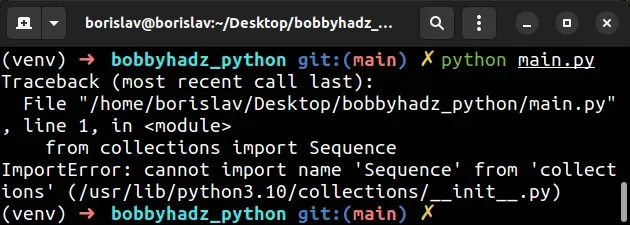
ImportError: cannot import name 'Sequence' from 'collections' (/usr/lib/python3.10/collections/__init__.py)
There was a change in Python 3.10 and the Sequence class has been moved to the
collections.abc
module.
# Update your import statements
If you use Python version 3.10+, change your imports from the following.
# ⛔️ Old import for versions older than Python3.10 from collections import Sequence print(Sequence)
To import from the collections.abc module.
# ✅ New import for versions Python3.10+ from collections.abc import Sequence # 👇️ <class 'collections.abc.Sequence'> print(Sequence)
Your error message will contain the file and line where the error is raised.
# Running your code in multiple Python versions
try/except statement.try: # 👇️ Using python 3.10+ from collections.abc import Sequence except ImportError: # 👇️ Using python 3.10- from collections import Sequence # 👇️ <class 'collections.abc.Sequence'> print(Sequence)
The try statement tries to import the Sequence class from the
collections.abc module and if an ImportError is raised, we know we are
running a version older than 3.10, so we import the class from the collections
module.
You can view all of the classes that are available in the collections.abc
module in
this section
of the docs.
# Upgrade packages that cause the error
If you got the error when pip installing a third-party module, try upgrading
the module's version.
pip install requests --upgrade pip3 install requests --upgrade python3 -m pip install requests --upgrade
requests with the name of the package you are trying to install.If that didn't help, try running the pip install command with the --pre
option.
The --pre option makes it so pip includes pre-release and development
versions of the package. By default pip only finds stable versions.
pip install requests --pre pip3 install requests --pre python -m pip install requests --pre python3 -m pip install requests --pre
Make sure to replace requests with the name of the actual package you are
trying to install.
--pre if you need to get access to a feature that is not yet available in the stable version.This helps sometimes because there might be a prerelease version where the
import statement has been updated to from collections.abc import Sequence
which is the correct import in Python 3.10+.
# Patch the error by adding attributes to the collections module
Alternatively, you can add attributes to the collections module and point the
attributes to the classes in collections.abc.
import collections.abc # 👇️ Add attributes to `collections` module # Before you import the package that causes the issue collections.Sequence = collections.abc.Sequence collections.Mapping = collections.abc.Mapping collections.MutableMapping = collections.abc.MutableMapping collections.Iterable = collections.abc.Iterable collections.MutableSet = collections.abc.MutableSet collections.Callable = collections.abc.Callable # 👇️ import the problematic module below # import problematic_module
You only have to add the attributes for the classes the module imports.
Make sure to import the module that causes the issue after you have added the necessary attributes.
You can check your Python version with the python --version command.
python --version python3 --version

You can download a specific version (e.g. 3.9) from the official python.org website.
Different versions are available in the "Looking for a specific release" table.

Make sure to tick the following options if you get prompted:
- Install launcher for all users (recommended)
- Add Python to PATH (this adds Python to your PATH environment variable)
To solve the Python "ImportError: cannot import name 'Sequence' from 'collections'" error:
- Import the
Sequenceclass fromcollections.abc, as a change was made in Python 3.10. - Update the versions of any modules that have old import statements.
- Alternatively, revert to Python 3.9 if you are unable to make corrections.
# ImportError: cannot import name Iterable from 'collections'
The Python "ImportError: cannot import name 'Iterable' from 'collections'" occurs for multiple reasons:
- Trying to import the
Iterableclass from thecollectionsmodule in Python versions 3.10+. - Installing a module that imports the
Iterableclass from thecollectionsmodule using Python versions 3.10+.
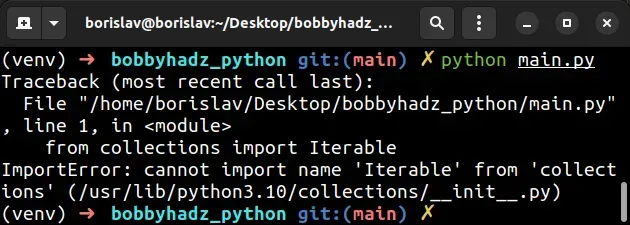
ImportError: cannot import name 'Iterable' from 'collections' (/usr/lib/python3.10/collections/__init__.py)
There was a change in Python 3.10 and the Iterable class has been moved to the
collections.abc
module.
# Update your import statements
If you use Python version 3.10+, change your imports from the following.
# ⛔️ Old import for versions older than Python3.10 from collections import Iterable print(Iterable)
To import from the collections.abc module.
# ✅ New import for versions Python3.10+ from collections.abc import Iterable # 👇️ <class 'collections.abc.Iterable'> print(Iterable)
Your error message will contain the file and line where the error is raised.
# Running your code in multiple Python versions
try/except statement.try: # 👇️ Using python 3.10+ from collections.abc import Iterable except ImportError: # 👇️ Using python 3.10- from collections import Iterable # 👇️ <class 'collections.abc.Iterable'> print(Iterable)
The try statement tries to import the Iterable class from the
collections.abc module and if an ImportError is raised, we know we are
running a version older than 3.10, so we import the class from the collections
module.
You can view all of the classes that are available in the collections.abc
module in
this section
of the docs.
# Upgrade packages that cause the error
If you got the error when pip installing a third-party module, try upgrading
the module's version.
pip install requests --upgrade pip3 install requests --upgrade python3 -m pip install requests --upgrade
requests with the name of the package you are trying to install.If that didn't help, try running the pip install command with the --pre
option.
The --pre option makes it so pip includes pre-release and development
versions of the package. By default pip only finds stable versions.
pip install requests --pre pip3 install requests --pre python -m pip install requests --pre python3 -m pip install requests --pre
Make sure to replace requests with the name of the actual package you are
trying to install.
--pre if you need to get access to a feature that is not yet available in the stable version.This helps sometimes because there might be a prerelease version where the
import statement has been updated to from collections.abc import Iterable
which is the correct import in Python 3.10+.
# Patch the error by adding attributes to the collections module
Alternatively, you can add attributes to the collections module and point the
attributes to the classes in collections.abc.
import collections.abc # 👇️ Add attributes to `collections` module # Before you import the package that causes the issue collections.Iterable = collections.abc.Iterable collections.Mapping = collections.abc.Mapping collections.MutableMapping = collections.abc.MutableMapping collections.MutableSet = collections.abc.MutableSet collections.Callable = collections.abc.Callable # 👇️ import the problematic module below # import problematic_module
You only have to add the attributes for the classes the module imports.
Make sure to import the module that causes the issue after you have added the necessary attributes.
You can check your Python version with the python --version command.
python --version python3 --version

You can download a specific version (e.g. 3.9) from the official python.org website.
Different versions are available in the "Looking for a specific release" table.

Make sure to tick the following options if you get prompted:
- Install launcher for all users (recommended)
- Add Python to PATH (this adds Python to your PATH environment variable)
To solve the Python "ImportError: cannot import name 'Iterable' from 'collections'" error:
- Import the
Iterableclass fromcollections.abc, as a change was made in Python 3.10. - Update the versions of any modules that have old import statements.
- Alternatively, revert to Python 3.9 if you are unable to make corrections.
# ImportError: cannot import name Callable from 'collections'
The Python "ImportError: cannot import name Callable from 'collections'" occurs for multiple reasons:
- Trying to import the
Callableclass from thecollectionsmodule in Python versions 3.10+. - Installing a module that imports the
Callableclass from thecollectionsmodule using Python versions 3.10+.
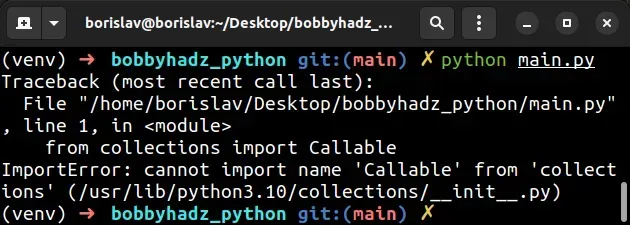
ImportError: cannot import name 'Callable' from 'collections' (/usr/lib/python3.10/collections/__init__.py)
There was a change in Python 3.10 and the Callable class has been moved to the
collections.abc
module.
# Update your import statements
If you use Python version 3.10+, change your imports from the following.
# ⛔️ Old import for versions older than Python3.10 from collections import Callable print(Callable)
To import from the collections.abc module.
# ✅ New import for versions Python3.10+ from collections.abc import Callable # 👇️ <class 'collections.abc.Callable'> print(Callable)
Your error message will contain the file and line where the error is raised.
# Running your code in multiple Python versions
try/except statement.try: # 👇️ Using python 3.10+ from collections.abc import Callable except ImportError: # 👇️ Using python 3.10- from collections import Callable # 👇️ <class 'collections.abc.Callable'> print(Callable)
The try statement tries to import the Callable class from the
collections.abc module and if an ImportError is raised, we know we are
running a version older than 3.10, so we import the class from the collections
module.
You can view all of the classes that are available in the collections.abc
module in
this section
of the docs.
# Upgrade packages that cause the error
If you got the error when pip installing a third-party module, try upgrading
the module's version.
pip install requests --upgrade pip3 install requests --upgrade python3 -m pip install requests --upgrade
requests with the name of the package you are trying to install.If that didn't help, try running the pip install command with the --pre
option.
The --pre option makes it so pip includes pre-release and development
versions of the package. By default pip only finds stable versions.
pip install requests --pre pip3 install requests --pre python -m pip install requests --pre python3 -m pip install requests --pre
Make sure to replace requests with the name of the actual package you are
trying to install.
--pre if you need to get access to a feature that is not yet available in the stable version.This helps sometimes because there might be a prerelease version where the
import statement has been updated to from collections.abc import Callable
which is the correct import in Python 3.10+.
# Patch the error by adding attributes to the collections module
Alternatively, you can add attributes to the collections module and point the
attributes to the classes in collections.abc.
import collections.abc # 👇️ Add attributes to `collections` module # Before you import the package that causes the issue collections.Callable = collections.abc.Callable collections.Mapping = collections.abc.Mapping collections.MutableMapping = collections.abc.MutableMapping collections.Iterable = collections.abc.Iterable collections.MutableSet = collections.abc.MutableSet # 👇️ import the problematic module below # import problematic_module
You only have to add the attributes for the classes the module imports.
Make sure to import the module that causes the issue after you have added the necessary attributes.
You can check your Python version with the python --version command.
python --version python3 --version

You can download a specific version (e.g. 3.9) from the official python.org website.
Different versions are available in the "Looking for a specific release" table.

Make sure to tick the following options if you get prompted:
- Install launcher for all users (recommended)
- Add Python to PATH (this adds Python to your PATH environment variable)
To solve the Python "ImportError: cannot import name 'Callable' from 'collections'" error:
- Import the
Callableclass fromcollections.abc, as a change was made in Python 3.10. - Update the versions of any modules that have old import statements.
- Alternatively, revert to Python 3.9 if you are unable to make corrections.

